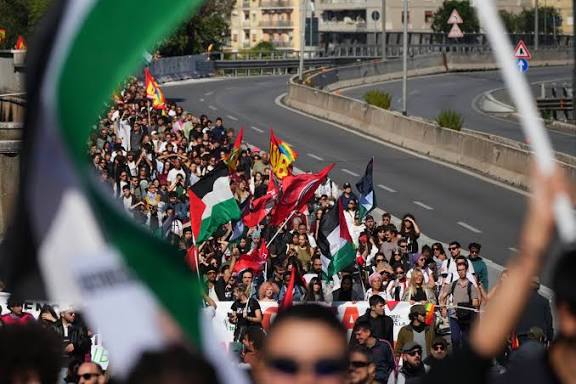Rome, Italy — October 3, 2025 — In one of the largest demonstrations in recent Italian history, over 2 million people across more than 100 cities took to the streets Friday in a nationwide general strike to protest the situation in Gaza and express solidarity with humanitarian efforts.

The strike, orchestrated by Italy’s largest union CGIL, brought key public services to a standstill. Reports indicate 60 % national participation in essential sectors, with schools, rail, and public transport severely disrupted. In Rome alone, CGIL claimed 300,000 demonstrators marched through central arteries.

The catalyst: the interception of the Global Sumud Flotilla, a humanitarian mission bound for Gaza, by Israeli naval forces earlier this week. Union leaders and protesters framed the strike as resistance against what they called complicity in blockade policies and humanitarian crisis.
Historical Context & Patterns of Protest
Italy is no stranger to large-scale strikes. The 2014 general strike, for example, saw widespread labour unrest in response to proposed labor reforms. But what distinguishes this moment is the moral intensity rather than purely economic grievance — solidarity with a foreign cause grounding domestic disruption.

Moreover, this is the second major strike in recent weeks linked to Gaza protests. A 24-hour strike on September 22 involved hundreds of thousands and set the stage for today’s escalation.
Dynamics & Reactions
Peaceful but Disrupted
For the most part, the demonstrations remained peaceful. Some clashes erupted — notably in Milan and Turin — where vandalism and crowd-police altercations were reported. Some metro and rail services were canceled or delayed; airports experienced selective disruption, though metro lines in Rome and Milan reportedly functioned in parts.
Political Pushback
Prime Minister Giorgia Meloni sharply criticized the strike, accusing unions of abusing the protest for a long weekend and asserting that it was politically motivated. Some ministers echoed that framing, labeling parts of the movement disruptive and irresponsible.
Opposition voices and union leaders, however, defended the strike as a legitimate expression of public conscience. CGIL head Maurizio Landini described it as a moral stand against war, militarism, and the erosion of humanitarian norms.
Why This Matters: Comparative Analysis & Significance
Proxy of Global Sentiment
This Italy strike aligns with a wave of global solidarity actions. In Spain, France, Greece, and other European capitals, massive protests have taken place in recent days against the Gaza conflict. The Italian strike is among the most sustained and disruptive, showing that foreign policy issues can galvanize mass domestic mobilization.
When Labour Meets Morality
In democratic societies, unions typically mobilize over wages, jobs, or workers’ rights. But here, labor activism is increasingly aligning with moral and geopolitical causes. Italy’s labor movement is asserting itself as a vehicle for larger human rights advocacy, not merely industrial interest. This shift mirrors movements seen in South Korea, Brazil, and other nations where mass protests respond not just to domestic policy but global justice.
Government Under Pressure
Meloni’s coalition and her positioning between Europe, Israel, and Arab states places her in a tightrope. The sheer size of this strike and its moral framing reduce her maneuvering room. If the protest momentum continues, her government could face demands to rethink diplomatic posture or break with traditional alliances.
Youth Mobilization
Reports emphasize that youth turnout was exceptional, with young Italians making the strike not just about foreign policy, but about values, agency, and identity. This matches a global trend: Gen Z activism is now a visible force in public life, capable of reframing politics.
Challenges & Caveats
Numbers vs. Verification: The 2 million figure is union-reported and not independently verified in full. Some city counts (like Rome) carry internal and external dispute
Sustainability: One-day strikes create drama, but the question now is whether they translate into sustained policy change.
Public Backlash: While many support the cause, ordinary citizens inconvenienced by transport shutdowns or service disruption may grow resentful, especially if protests persist.
Security Risks: Clashes, vandalism, and police overreach could sour public opinion and delegitimize the movement if not managed carefully.

Implications for Nigeria and Beyond
For Nigeria and other developing nations, the Italian strike offers a cautionary and hopeful lesson:
1. Public outrage can rise beyond bread-and-butter issues.
The empathy for Gaza, framed through human dignity, became a rallying point even for those not directly affected.
2. Moral legitimacy challenges state narratives.
When citizens believe their government is complicit in injustice, they may reject conventional politics altogether.
3. Youth are no longer passive voices.
Young citizens, digitally connected and morally expressive, are pushing their countries to reconcile domestic policy with global justice.
4. Policy must follow protest.
Mobilization without strategic demands and bridge-building leads to protest fatigue or state suppression.
For Italy, the strike intensifies pressure on Meloni’s government, forces diplomatic recalibration, and tests whether public protest can breach the boundaries of foreign policy.
For the world, it’s a signal: in 2025, global crises demand real engagement. Governments ignoring public conscience do so at their peril.
Dr. G. Fraser. MFR
International Correspondent
Headlinenews.news Special report.




